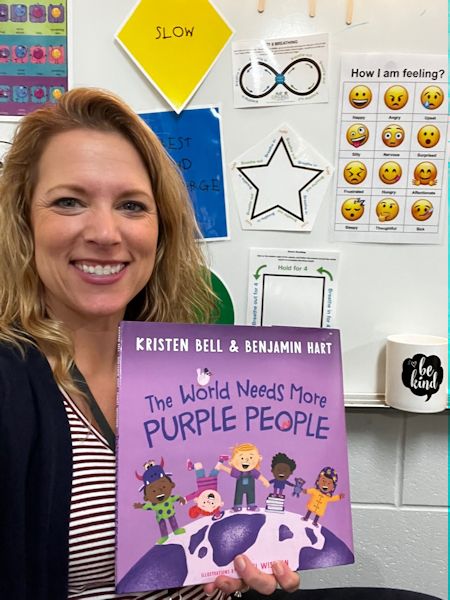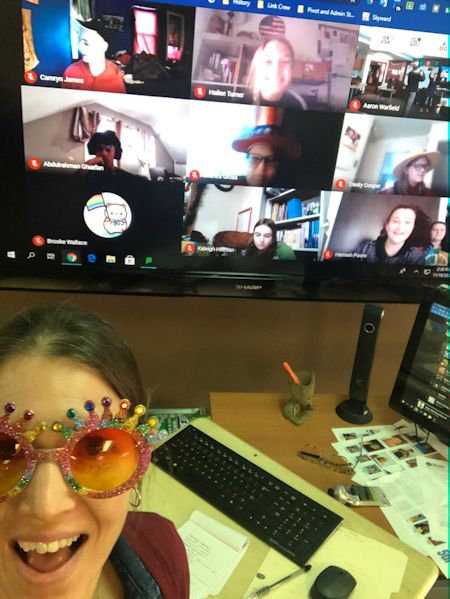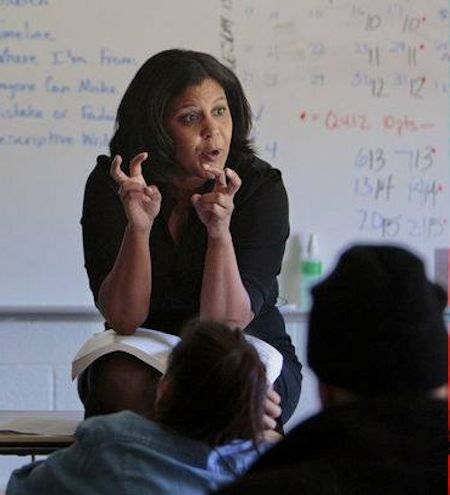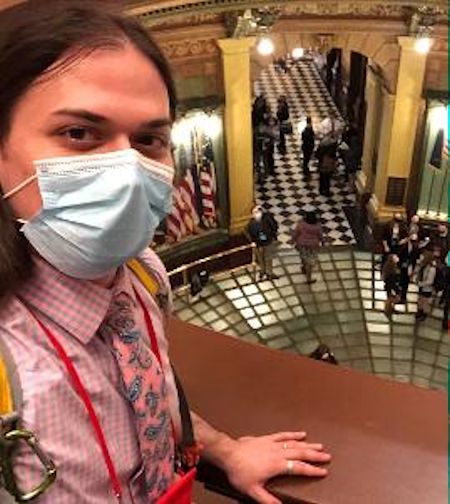The COVID pandemic began in March of 2020 and schools have not been the same since. Four United Methodist educators share how their lives have been affected. The second of a two-part series.
GLENN M. WAGNER
Michigan Conference Communications
This story is the second of a two-part feature sharing conversations with Michigan educators with United Methodist connections about their experiences teaching through the global coronavirus pandemic. Teachers are deserving of community support and gratitude. Their lessons learned can benefit us all.
Learning new skills in Grandville

Trisha Malott is a graduate of Western Michigan and Grand Valley State University. During the first 12 years of her career, Malott served as a social worker in Martin and Grandville public schools. For the past three years, she has been the Social and Emotional Learning Coach for the 487 students at Cummings Elementary School (Pre-K – 6th grade) in Grandville, MI. Grandville is a suburb of nearly 16,000 people located southwest of Grand Rapids. Trisha is married and a mother to three children aged 9, 7, and 3. She and her family attend the Georgetown United Methodist Church.
Malott produces a weekly Social Emotional Learning curriculum for other teachers’ use. She also facilitates small groups, and 1-on-1 support focused on the students’ social, emotional, and behavioral needs at Cummings and in remote classes. In addition, she coordinates services with outside agencies to ensure that students’ physical and mental health needs are met. For example, Trisha has taken students to eye appointments, hosted the Mobile Dentist, conducted groups with Ele’s Place Grief group, and worked closely with other mental health professionals in the community.
Malott has noticed the pandemic has created high anxiety levels in many of her students who worry about food and shelter insecurities at home. Children from homes where marriages are stressed or broken often bring those issues to school. Some students express personal difficulties in disruptive behavior and visible irritability. Others who are stressed turn inward and withdraw emotionally. She knows worry about the pandemic inspired nearly 70% of the students in her school to voluntarily wear masks during a season of heightened infection outbreaks, even without a mask mandate in place.
The pandemic has also helped many of her fellow teachers become more proficient in using technology in the classroom. Malott remarked, “Before the pandemic, I had never taught a virtual class online before. The pandemic has forced me to learn this valuable new skill, which has been a good thing.” She observed that another plus of the pandemic has been the shared recognition of the necessity for good mental health interventions with students, families, and faculty.
Malott credits her years attending church camp at Lake Michigan, Wesley Woods, and Lake Louise with her vocational calling to help others in need and do what she can to share God’s love in tangible ways. Malott sees the importance of her role in being of service to others and standing in support alongside LGBTQ kids, children with a disability, those from broken circumstances at home, and those who struggle emotionally.
Malott is passionate about her work. Her experienced honesty should help concerned citizens offer informed support for our educators, students, and schools. Malott shares:
“The toughest part of this year is the misinformation that’s being spread among parents about what’s happening in the public schools. Suddenly, our goal of being welcoming and accepting of all students has been turned into hidden agendas by the media. Teachers have gone from being heroes to the target of scrutiny from some parents. Materials are being picked apart, and inaccurate assumptions are being made. Teachers have such a difficult job, but they do it because they’re passionate about educating our youth. Unfortunately, public scrutiny cuts off passion, creativity, and the ability to meet the individual needs in their classrooms.”
Daily Mindfulness Minutes in Portage

Greathen Derenne is a high school history teacher at Portage Northern High School in Portage, MI. She grew up attending First United Methodist Church in Blissfield, MI, graduated from Western Michigan University, and has been inspired in her vocation by her mom and her brother, who are also teachers. Derenne has been teaching history for 20 years, ten years in Battle Creek, and ten years in Portage. She is married to Richard, an engineer, and she is the mother of two boys.
Derenne is passionate about helping her students get to know important events from the past and recognize how the world continues with similar issues in the present.
Derenne is well aware that the pandemic has brought great stress for many. After so much time spent learning virtually during classroom shutdowns during the pandemic, Derenne knows many students have forgotten the basic etiquette of being in a classroom. This is evidenced by frequent interruptions of persons who are speaking and an inability of many students to put away their electronic devices (phones and tablets) following extended periods at home when all of their learning was done through those devices.
Students at Portage Northern come from a diverse population of ethnic and socio-economic backgrounds. She knows students who are homeless and others whose families have expensive vacation homes in foreign countries. She recognizes that as a teacher, she is asked to wear multiple hats: parent, social worker, counselor, cheerleader, role model, and instructor. As a result, her teaching regularly involves more than covering the content of history books.
Derenne has found help for processing stress and facing daily challenges. She credits her daily exercise routine from 4:30 AM to 5:30 AM each morning with helping her to stay fit and focused. Derenne, an active member at Portage Chapel Hill United Methodist Church, knows her faith and sustaining small group friendships made at the church have also been significant. In addition, she has come to cherish the supportive community of teachers in her school as a vital piece of navigating the challenges posed by the pandemic.
A regular discipline that Derenne has used to help herself and her students is the pre-class mindfulness minute, in which she invites students to put their electronics down. She lowers the lights, asks for silence, and welcomes students to close their eyes and slow their breathing for a minute of centering and reflective stillness. Then, when students ask her to justify the practice, she asks them to do it with her and for her as a way that she can clear her mind and focus on being her best for this next class. Derenne has found that the mindfulness minute at the start of each class helps all center on learning.
Derenne has been troubled by the mixed messages about teachers given air-time in the media. She knows and appreciates that many parents support the teachers but also grieves how some have politicized things such as mask wearing and curriculum content and have criticized teachers for doing their jobs and working to keep all students safe and learning in the classroom in a challenging time.
She has praise for her district and the heroic way people pulled together to provide meals to the hungry and virtual education during extended periods of the pandemic.
Derenne remembers how teachers were called upon to learn new skills as virtual teachers during the pandemic and then were challenged even more to lead their students in hybrid classes where some of the students were attending class virtually, and some were present in the classroom. Her school still offers a virtual option for students to learn online but has decided to move away from hybrid classes because of the difficulty for teachers to give adequate attention simultaneously to students inside and outside the classroom.
Navigating COVID on the university campus

Diane Jackson is an adjunct faculty member in the sociology department at Ferris State University in Big Rapids, MI. Diane received her bachelor’s degree from Albion College and her master’s degree from DePaul University in Chicago. She began her career as an educator teaching elementary students for 12 years in Oak Park, IL. In 2013, she shifted to teaching sociology, working with college-age students at Grand Rapids Community College. Diane has been teaching sociology at Ferris State University since 2016. Diane grew up in West Michigan in an active United Methodist family. She married Shannon, an Information Technology Professional for Spectrum Health, in 2019 and has a stepson Jaxon who is in college.
Diane admits that the coronavirus pandemic has been a challenge for all. She remembers seriously considering taking a leave of absence at the outset of the pandemic. Students, parents, and teachers struggled to figure out how to cope with great changes forced by the spread of the virus. Adaptation to the new realities caused by the disease had to be done on the fly, without clear plans, experience, or training in how to cope. Teachers were expected to learn new skills and acquire technologies for virtual teaching, often without budgets, plans, special training in teaching in a pandemic, or consensus on the best way forward. Mask wearing and vaccines to keep people safe were politicized, and many of Jackson’s 160 students came from backgrounds and are at an age when they are ready to challenge authority as a necessary step toward their independence.
Diane taught all of her classes online for an entire year, from the spring of 2019 until March of 2020. She remembers parents getting upset that they were paying tuition and dorm expenses for students who sometimes tuned in to classes online. The university’s cafeterias served students carry-out boxed meals. Some students opted to work during the day to pay bills, and their online school work suffered for a lack of attention. Diane notes that Ferris State University is known for its specialized training in vocational trades but still has classes like sociology as a part of its general education requirements for graduation. Initially, many students opt to take her class because they have to without understanding how sociology will enrich their lives. Diane knows that current local, national, and global events are evidence enough of our human need for good sociological understanding.
She also believes that the church and people who live out the gospel message of love for God and neighbor are essential in helping to grow community and bring healing and hope to the broken.
Jackson’s students come from diverse racial backgrounds. She knows that dealing with interracial issues, an important topic in her class, is much more challenging when done virtually instead of in person and together in a classroom.
Munising teacher learned skills at church camp

Eric Lynch teaches history and government to middle and high school students in the Upper Peninsula’s Munising Public Schools. A graduate of the University of Michigan and Northern Michigan University, Lynch is also husband to Brianna and a proud father of a three-year-old daughter. Lynch found his calling to be a teacher while attending church camp each summer at the United Methodist Camp Michigamme in Michigamme, MI, where he met Brianna in service together as counselors. They held their wedding at the camp. Lynch credits his experience as a church camp counselor with developing his talents as a teacher and helping to clarify his sense of calling as an educator with young people. In addition, he has been inspired by both of his parents, who were also teachers.
Lynch notes that the Munising Public Schools is a small district with just over 600 students. He has found Munising to be a welcoming community with many families that have been in the area for generations. The Sault Tribe of Chippewa Indians, the largest federally recognized tribal group in Michigan, maintains a tribal center in Munising. The tourist industry helps the economy in the summer with attractions of nearby Pictured Rocks and area waterfalls. Significant employers are a paper mill, tech company, prison, and nearby tribal casino.
Lynch has learned valuable lessons during the pandemic, such as staying flexible as he does not know what will happen. He remembers when the pandemic was followed in 2020 by the governor’s shut down of the school, which was initially supposed to last three weeks but lasted much longer. Lynch has learned to identify with a community and his students, who were all struggling to cope. Before the pandemic, he had never taught a virtual class. Lynch praised the staff at the school for collaborating to extend internet accessibility so students could continue to learn from home. Sustaining meals and lessons were delivered regularly from the school to homes thanks to the heroic efforts of school personnel.
Shortly after the pandemic outbreak and before vaccines were available, the COVID death of the school’s discipline officer was a sobering reminder to Munising of the danger of the virus. Lynch noted that an outbreak of COVID on the school football team was a stimulus for many students to choose to be vaccinated. One of his students asked him if it was selfish to get vaccinated so as not to have to miss valued school events like athletics and dances. Lynch credits an early and partially controversial District-wide mask mandate with keeping the pandemic in check and allowing the Munising schools to have a lower infection rate than other districts that did not require masks.
Lynch, who attends Wesley United Methodist Church in Ishpeming, credits his Christian faith with shaping his sense of what it means to be a teacher. He keeps the scripture passage first learned at church camp from 1 Peter 5:2 NRSV as a guide for his classroom leadership.
Care for the flock that God has entrusted to you. Watch over it willingly, not grudgingly—not for what you will get out of it, but because you are eager to serve God.
What lessons have these teachers shared that can help us all in these challenging times? Mindfulness and exercise can be crucial in coping with stress. Sabbath rest can be restorative. Finding support from colleagues and friends is helpful. Learn to listen for the deeper needs of others. Troubling behavior is a visible sign of troubles elsewhere. Remain flexible, be willing to learn new things, and stay hopeful in service to Christ. Our teachers are front-line heroes and deserve our support, prayers, and respect.
~ see Part 1, “MI educators learned during COVID,” featuring Beth Peterson (Escanaba), Dan DeZwaan (Allendale), and Marci Oliver (Detroit).
Last Updated on September 20, 2022

